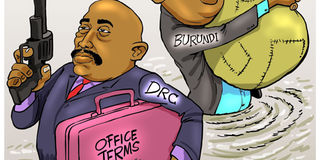CROSSROADS : Conflicts make DRC, Burundi poorer….

What you need to know:
- Some reports show that DRC’s mineral wealth is worth over a combined GDP of Europe and the US yet it is described as one of the poorest in the world. The reality of extreme poverty among the Congolese majority is a sad song, a daily sordid reality despite living in an extremely natural wealth rich nation.
Ideally, the Democratic Republic of Congo (DRC) is one of the richest countries on earth with natural resources estimated to run into trillions US dollars. Its unmatched natural resources, which include world’s largest cobalt reserve, makes it a nation to watch, world over.
Some reports show that DRC’s mineral wealth is worth over a combined GDP of Europe and the US yet it is described as one of the poorest in the world. The reality of extreme poverty among the Congolese majority is a sad song, a daily sordid reality despite living in an extremely natural wealth rich nation.
What is the biggest problem with Congo? Political instability and war over the years have caused a lot of misery. It was thought that youthful President Joseph Kabila would end decades of war and instability, but it was just a mere wish.
The country will hold its general elections in 2017 and President Kabila will not take part. Hopefully, the new leadership after Kabila will unify the nation and bring the much needed political stability, without which an economic take off for the majority people is just but a dream.
Our other neighbour, Burundi is in another crisis that began in April 2015. This was after President Nkurunziza decided to run for a third term in office. With serious human rights violations including mass displacements and deaths, we thought history would have taught Burundi politicians a lesson, but it has not.
For the political mistakes of power men in the two countries, Tanzania has to pay the price of hosting refugees. According to a Unicef report released last February, “Tanzania hosts the largest number of Burundian refugees in the region.” At the moment, there are about 298,439 refugees from Burundi and the DRC in three refugee camps in Kigoma Region, with an influx of 600 to 700 Burundi refugees every day!
No wonder President John Magufuli is very concerned that there should be lasting peace in the two countries. Recently, he told UN Secretary-General Antonio Guterres that the “instability in the two countries has created refugees’ influx into Tanzania and its neighbours.” He was categorical that restoring political stability was the only way to resolve the crisis in the two nations.
Thinking about Burundi and DRC’s crises and Tanzania’s efforts to bring peace, it reminds us of the decades of the Founding Father Mwalimu Julius Nyerere to promote peace in Africa. His passion in promoting endogenous development, self-reliance, solidarity, peace and social justice is what turned him in to a legendary leader.
Mwalimu Nyerere was the mediator of Burundi peace talks that began in 1995. Peace based on the principles of democracy and security for all, was the message he was hammering home to the warring ethnic groups. His efforts together with those of the late South African President Nelson Mandela paid off and led to the Arusha Peace Accord, which ended the 12 year old civil war. Mwalimu thought it would be the end of the conflict and cycles of massacres since Burundi’s independence back in 1962.
There was relative peace in Burundi until the current president decided to break the Arusha Accord and run for a third term, according to his critics.
Fast forward today, former Tanzanian President Benjamin Mkapa is the mediator of the ongoing crisis in Burundi. It is very clear that, overstay in power by leaders of DRC and Burundi has greatly contributed to the crisis in the two lands.
In Uganda, President Museveni has been there for ages, changing the constitution as he wants just to retain power. Of course Uganda is not like DRC or Congo, and there is relative peace. But is it fair? Anytime we have a neighbouring country which is in political turmoil, Tanzania pays a heavy price. When will such turmoils stop?
Saumu Jumanne is an assistant lecturer with the Dar es Salaam University College of Education (DUCE)




